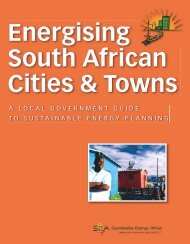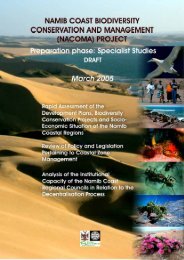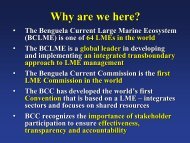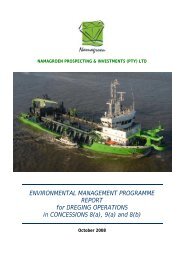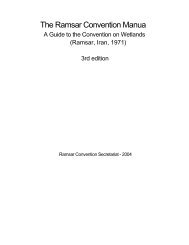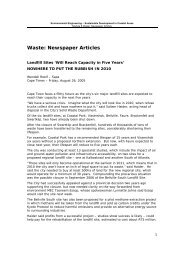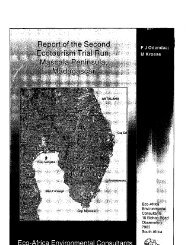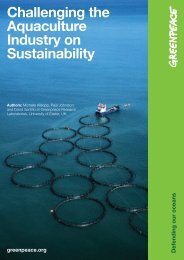Feasibility Study of Proposed Tourism Dev in Shewula, NE ...
Feasibility Study of Proposed Tourism Dev in Shewula, NE ...
Feasibility Study of Proposed Tourism Dev in Shewula, NE ...
Create successful ePaper yourself
Turn your PDF publications into a flip-book with our unique Google optimized e-Paper software.
Chapter 1 - Introduction<br />
It has become <strong>in</strong>creas<strong>in</strong>gly evident that community development through ecotourism<br />
can fulfil a dual function. On the one hand, communities with a relatively <strong>in</strong>significant<br />
cash economy can broaden their livelihood options through <strong>in</strong>volvement <strong>in</strong> tourism.<br />
This <strong>of</strong>fers community members more opportunities for development, both <strong>of</strong><br />
<strong>in</strong>frastructure and <strong>of</strong> human resources. On the other hand, ecotourism can also<br />
contribute towards the conservation <strong>of</strong> natural and cultural resources.<br />
<strong>Tourism</strong>, and especially ecotourism, is one <strong>of</strong> the fastest grow<strong>in</strong>g economic sectors<br />
on a regional and global scale. This pattern <strong>of</strong> growth is be<strong>in</strong>g realised <strong>in</strong> southern<br />
Africa, where ecotourism is be<strong>in</strong>g promoted extensively, especially at the community<br />
level. Community-based ecotourism <strong>of</strong>fers the potential for community<br />
empowerment. Thus, community development through ecotourism is a good<br />
opportunity to improve the local economy.<br />
1.4. CONCEPTUAL FRAMEWORK<br />
A conceptual framework for the study was def<strong>in</strong>ed before the fieldwork commenced,<br />
and was based on a set <strong>of</strong> pr<strong>in</strong>ciples that are derived from several discipl<strong>in</strong>es. The<br />
conceptual framework was <strong>in</strong>formed by a general literature review and<br />
documentation <strong>of</strong> case studies <strong>of</strong> Community-Based Ecotourism and Natural<br />
Resource Management projects, and by the application <strong>of</strong> the theoretical pr<strong>in</strong>ciples<br />
<strong>of</strong> Integrated Environmental Management (IEM) to the planned tourism development<br />
<strong>in</strong> <strong>Shewula</strong>.<br />
Ecotourism<br />
The proposed <strong>Shewula</strong> tourism development is essentially an ecotourism<br />
development. The aims <strong>of</strong> this development are well aligned to the pr<strong>in</strong>ciples<br />
underly<strong>in</strong>g the Ecotourism Society's def<strong>in</strong>ition <strong>of</strong> ecotourism stated below:<br />
'Ecotourism is responsible travel to natural areas which conserves the environment<br />
and improves the welfare <strong>of</strong> local people'. 2<br />
The Ecotourism Society expands on this broad def<strong>in</strong>ition <strong>of</strong> ecotourism by expla<strong>in</strong><strong>in</strong>g<br />
ecotourism; '...<strong>in</strong> other words, [ecotourism] <strong>in</strong>corporates both a strong commitment to<br />
nature and a sense <strong>of</strong> social responsibility'. 3<br />
This illustrates a sense <strong>of</strong> susta<strong>in</strong>ability that will contribute to the improvement <strong>of</strong> well<br />
be<strong>in</strong>g <strong>of</strong> humans. This <strong>in</strong> fact is an underly<strong>in</strong>g pr<strong>in</strong>ciple <strong>of</strong> development. <strong>Dev</strong>elopment<br />
assumes growth <strong>in</strong> order that there is an improvement <strong>of</strong> human welfare. Historically<br />
however, human welfare has been based on economic pr<strong>in</strong>ciples alone.<br />
Ecotourism, which is <strong>of</strong>ten hailed as an avenue towards susta<strong>in</strong>able development,<br />
faces many challeng<strong>in</strong>g realities. For example:<br />
• Fundamentally, ecotourism provides an arena for the <strong>in</strong>teraction <strong>of</strong> two world<br />
views, those <strong>of</strong> the develop<strong>in</strong>g and the developed. This br<strong>in</strong>gs two sets <strong>of</strong><br />
differ<strong>in</strong>g perspectives and needs <strong>in</strong>to direct contact with each other, provid<strong>in</strong>g<br />
many opportunities for misunderstand<strong>in</strong>gs.<br />
• Ecotourism development, challenged with hav<strong>in</strong>g to deal with susta<strong>in</strong>able<br />
ideology and the reality <strong>of</strong> economic poverty, highlights the complexities <strong>in</strong>volved<br />
with community development.<br />
2<br />
L<strong>in</strong>dberg, K. (ed.) 1993: Ecotourism: A Guide for Planners and Managers. Ecotourism Society, Vermont.<br />
3<br />
Ibid.




